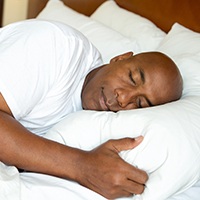 Sleep Apnea is described as a serious sleep disorder that occurs when a person's breathing is interrupted during sleep. People with untreated sleep apnea stop breathing repeatedly during sleep, sometimes hundreds of times. This means the brain -- and the rest of the body -- may not get enough oxygen.
Sleep Apnea is described as a serious sleep disorder that occurs when a person's breathing is interrupted during sleep. People with untreated sleep apnea stop breathing repeatedly during sleep, sometimes hundreds of times. This means the brain -- and the rest of the body -- may not get enough oxygen.
There are two types of sleep apnea:
Research shows that 1 in every 15 Americans, which is equal to approximately 18 Million people, suffer from some form of Sleep Apnea. It is due to many myths regarding this disorder that many go untreated.
Myth. Snoring can be a symptom of the sleep disorder, but there's a big difference between the two. People with the condition actually stop breathing up to 400 times throughout the night. These pauses last 10 to 30 seconds, and they're usually followed by a snort when breathing starts again. This breaks your sleep cycle and can leave you tired during the day.
Myth. All those breaks in sleep take a toll on your body and mind. When the condition goes untreated, it's been linked to job-related injuries, car accidents, heart attacks, and strokes
Fact. The most common type of the disorder is obstructive sleep apnea or OSA. It happens when your tongue, tonsils, or other tissues in the back of the throat block your airway. When you try to breathe in, the air can't get through. Central sleep apnea is less common than OSA. It means the brain doesn't always signal the body to breathe when it should.
Myth. Doctors estimate that more than 18 million Americans have sleep apnea. It's more common after age 40, but it can affect people of all ages. You're more likely to have the condition if you're overweight, a man, African-American, or Latino. The disorder also tends to run in families.
Myth. A nightcap may make you drowsy, but it won't help you get the quality rest you need. Alcohol relaxes the muscles in the back of your throat. That makes it easier for the airway to become blocked in people with sleep apnea. Sleeping pills have the same effect.
Myth. OSA is common in children, affecting as many as 1 in 10. In most cases, the symptoms are mild, and the child eventually outgrows it. But some may start to have behavior troubles or serious medical problems because of it.
Fact. You can make sleep apnea symptoms better when you shed even a small percentage of your body weight. If you're carrying around extra pounds, talk to your doctor about starting a weight loss program. It also helps to quit smoking, so ask about treatments that can help.
Fact. If you sleep on your back, gravity can pull the tissues in the throat down, where they're more likely to block your airway. Sleep on your side instead to open your throat. Certain pillows can help keep you on your side. Some people even go to bed in shirts with tennis balls sewn onto the back.
Fact. A dentist or orthodontist can fit you with a mouthpiece or oral appliance to ease mild sleep apnea. The device is custom-made for you, and it adjusts the position of your lower jaw and tongue. You put it in at bedtime to help keep your airway open while you sleep.
Fact. It stands for continuous positive airway pressure. A CPAP machine blows a steady stream of air into your airway. You can adjust the flow until it's strong enough to keep your airway open while you sleep. It's the most common treatment for adults with moderate to severe OSA.
Myth. For some people, an operation may be able to cure OSA. A good example is a child with large tonsils that block her airway. Doctors can remove the tonsils to solve the problem. Some adults can improve their symptoms with surgery to shrink or stiffen floppy tissues, but that's not a good choice for everyone. Talk to your doctor about the pros and cons of an operation before you go that route.
Sleep apnea can affect anyone at any age, even children. Risk factors for sleep apnea include:
Some of the effects of sleep apnea include feeling very sleepy and having difficulty concentrating. In some cases, the effects can be more detrimental, such as depression, irritability, and falling asleep during the day. If a person has sleep apnea, the risk of heart attack, high blood pressure, and stroke also increases.
Here at Moreno & Young Dental, we take Sleep Apnea very seriously. Dr. Moreno and Dr. Young have been formally trained in sleep medicine and how to treat sleep disorders. If you feel that you might be suffering from Sleep Apnea call our office and make an appointment for a sleep evaluation so that you can get on the road to better sleep and better health.
Our professional, friendly dental team will make sure you have a wonderful experience at Moreno & Young Dental. We provide comprehensive preventive, family, restorative, and cosmetic dentistry services for Bellingham, Ferndale, Lynden, Everson, and surrounding areas.
If you suspect you have sleep apnea, you must undergo testing to properly diagnose the condition. There are various types available; however, the most common include polysomnography. This monitors your brain waves, oxygen levels, and other information while you sleep at a study center. As an alternative, there is also a home sleep study option available. Based on the results, we create the customized treatment plan you need to breathe easier and sleep better.